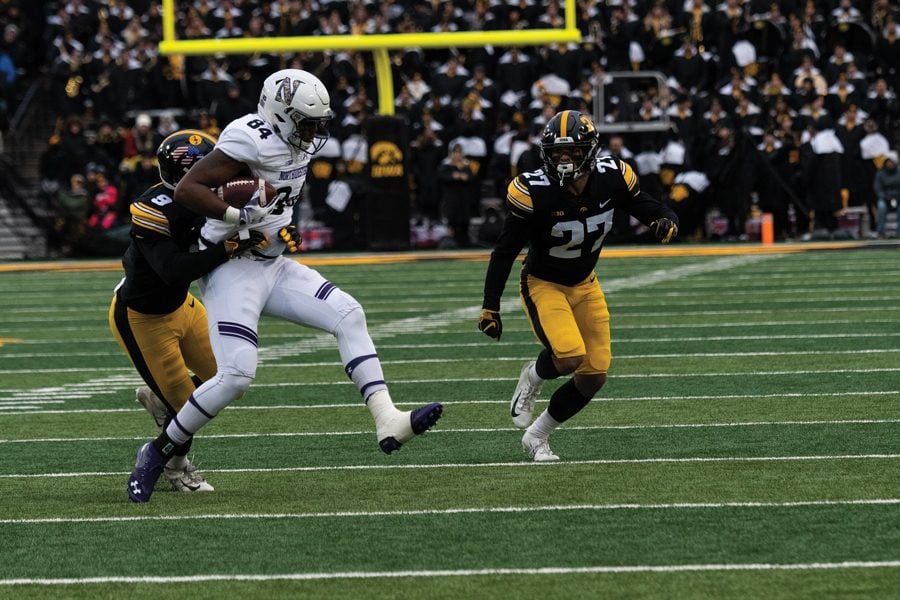Wilkinson: A Response to “I Miss Northwestern Football’s Losing Tradition” from The New York Times
Daily file photo by Alison Albeda
Cam Green fights through a Iowa tackle. The win gave Northwestern a place in Big Ten Championship game, ensuring that they will play 14 games this season.
November 13, 2018
Football
Saturday, the New York Times published an opinion piece entitled “ I Miss Northwestern Football’s Losing Tradition” by Carmel McCoubrey, a Northwestern alumna.
To this point, McCoubrey (Weinberg ‘86) cites the dangers presented by college football and the concern that Northwestern is spending a large amount of money on it (specifically, as many have, citing the new Walter Athletics Center). She notes that as Northwestern’s success has increased, so have the players’ injury risk (due to playing in more games) and the national exposure that leads to football-centric donations. These are explosive, interesting takes that could use more detailed explanation.
Instead, however, the article is framed from an anti-fan perspective in which the best way to reconcile the fact that college football is “not healthy” is to root for your team to lose.
First, the men out there in purple and white (and occasionally, for some reason, gray) almost all had offers from other schools to play football. If they didn’t attend Northwestern, they’d be facing the same safety concerns, just wearing a different uniform while they did so.
Additionally, McCoubrey’s focus solely on the safety of Northwestern athletes is misguided. After all, if the Wildcats are not playing in these extra football games, someone else will be. Is their safety less important simply because they don’t have “Northwestern” written on their jerseys? Certainly not.
McCoubrey also wrote that she was hesitant to donate, for worries that the university is “willing to risk its students’ health and happiness for a share of television revenue.” That derogatory reference to “television revenue” ignores that said revenue is essential in helping the university to fund other teams — from the field hockey team that she shouts out to the women’s golf team that almost won the national championship two years ago.
Football is dangerous in any quantity. Whether the Wildcats play 44 games (as they did in McCoubrey’s four years at the university) or 53 (as they will in my four), every moment will be dangerous. Those extra nine games (and corresponding weeks of practice) should not be taken lightly.
McCoubrey is not necessarily wrong about these things. To argue that college football is a morally bankrupt and dangerous enterprise is a valid point. Similarly, to claim that the amount of money poured into college football, possibly at the expense of other funding, is detrimental to universities is eminently defensible.
I am not the best person to criticize how someone reconciles their college football fandom. I know these dangers and moral bankruptcy of the institution, yet I still watch for 12-15 hours every Saturday (and plenty more hours on weeknight games).
But McCoubrey’s solution is not a moral justification. Whether the Wildcats win or lose has no influence on the overall health of the college football playing population. After all, the Big Ten Championship, and all 39 bowl games this year will occur whether Northwestern is a participant or not.
Email: [email protected]
Twitter: @joe_f_wilkinson












